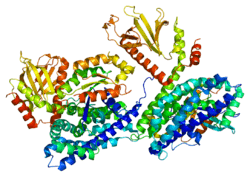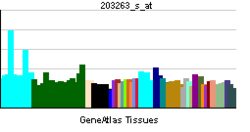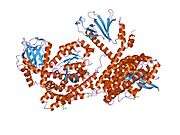ARHGEF9
| ARHGEF9 | |||||||||||||||||
|---|---|---|---|---|---|---|---|---|---|---|---|---|---|---|---|---|---|
 |
|||||||||||||||||
| |||||||||||||||||
| Identifiers | |||||||||||||||||
| Aliases | ARHGEF9, COLLYBISTIN, EIEE8, HPEM-2, PEM-2, PEM2, Cdc42 guanine nucleotide exchange factor 9 | ||||||||||||||||
| External IDs | MGI: 2442233 HomoloGene: 9053 GeneCards: ARHGEF9 | ||||||||||||||||
| |||||||||||||||||
| RNA expression pattern | |||||||||||||||||
  | |||||||||||||||||
| More reference expression data | |||||||||||||||||
| Orthologs | |||||||||||||||||
| Species | Human | Mouse | |||||||||||||||
| Entrez | |||||||||||||||||
| Ensembl | |||||||||||||||||
| UniProt | |||||||||||||||||
| RefSeq (mRNA) | |||||||||||||||||
| RefSeq (protein) | |||||||||||||||||
| Location (UCSC) | Chr X: 63.63 – 63.81 Mb | Chr X: 95.05 – 95.2 Mb | |||||||||||||||
| PubMed search | [1] | [2] | |||||||||||||||
| Wikidata | |||||||||||||||||
| View/Edit Human | View/Edit Mouse |
Rho guanine nucleotide exchange factor 9 is a protein that in humans is encoded by the ARHGEF9 gene.[3][4][5]
Function
ARHGEF9 belongs to a family of Rho-like GTPases that act as molecular switches by cycling from the active GTP-bound state to the inactive GDP-bound state. These proteins are key regulators of the actin cytoskeleton and are involved in cell signaling.[supplied by OMIM][5]
Interactions
ARHGEF9 has been shown to interact with GPHN[6] and SMURF1.[7]
References
- ↑ "Human PubMed Reference:".
- ↑ "Mouse PubMed Reference:".
- ↑ Reid T, Bathoorn A, Ahmadian MR, Collard JG (Dec 1999). "Identification and characterization of hPEM-2, a guanine nucleotide exchange factor specific for Cdc42". J Biol Chem. 274 (47): 33587–93. doi:10.1074/jbc.274.47.33587. PMID 10559246.
- ↑ Ishikawa K, Nagase T, Nakajima D, Seki N, Ohira M, Miyajima N, Tanaka A, Kotani H, Nomura N, Ohara O (Feb 1998). "Prediction of the coding sequences of unidentified human genes. VIII. 78 new cDNA clones from brain which code for large proteins in vitro". DNA Res. 4 (5): 307–13. doi:10.1093/dnares/4.5.307. PMID 9455477.
- 1 2 "Entrez Gene: ARHGEF9 Cdc42 guanine nucleotide exchange factor (GEF) 9".
- ↑ Kins S, Betz H, Kirsch J (2000). "Collybistin, a newly identified brain-specific GEF, induces submembrane clustering of gephyrin". Nat. Neurosci. 3 (1): 22–9. doi:10.1038/71096. PMID 10607391.
- ↑ Yamaguchi K, Ohara O, Ando A, Nagase T (Apr 2008). "Smurf1 directly targets hPEM-2, a GEF for Cdc42, via a novel combination of protein interaction modules in the ubiquitin-proteasome pathway". Biol. Chem. 389 (4): 405–13. doi:10.1515/BC.2008.036. PMID 18208356.
Further reading
- Suzuki Y, Yamashita R, Shirota M, Sakakibara Y, Chiba J, Mizushima-Sugano J, Nakai K, Sugano S (2004). "Sequence Comparison of Human and Mouse Genes Reveals a Homologous Block Structure in the Promoter Regions". Genome Res. 14 (9): 1711–8. doi:10.1101/gr.2435604. PMC 515316
 . PMID 15342556.
. PMID 15342556. - Harvey K, Duguid IC, Alldred MJ, Beatty SE, Ward H, Keep NH, Lingenfelter SE, Pearce BR, Lundgren J, Owen MJ, Smart TG, Lüscher B, Rees MI, Harvey RJ (2004). "The GDP-GTP exchange factor collybistin: an essential determinant of neuronal gephyrin clustering". J. Neurosci. 24 (25): 5816–26. doi:10.1523/JNEUROSCI.1184-04.2004. PMID 15215304.
- Grosskreutz Y, Hermann A, Kins S, Fuhrmann JC, Betz H, Kneussel M (2002). "Identification of a gephyrin-binding motif in the GDP/GTP exchange factor collybistin". Biol. Chem. 382 (10): 1455–62. doi:10.1515/BC.2001.179. PMID 11727829.
- Kins S, Betz H, Kirsch J (2000). "Collybistin, a newly identified brain-specific GEF, induces submembrane clustering of gephyrin". Nat. Neurosci. 3 (1): 22–9. doi:10.1038/71096. PMID 10607391.
This article is issued from Wikipedia - version of the 5/19/2016. The text is available under the Creative Commons Attribution/Share Alike but additional terms may apply for the media files.
